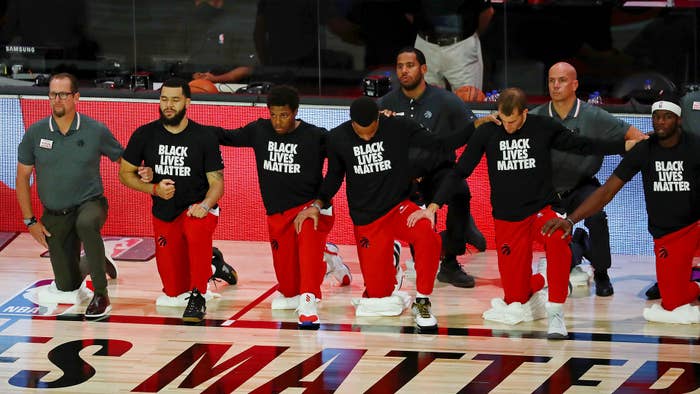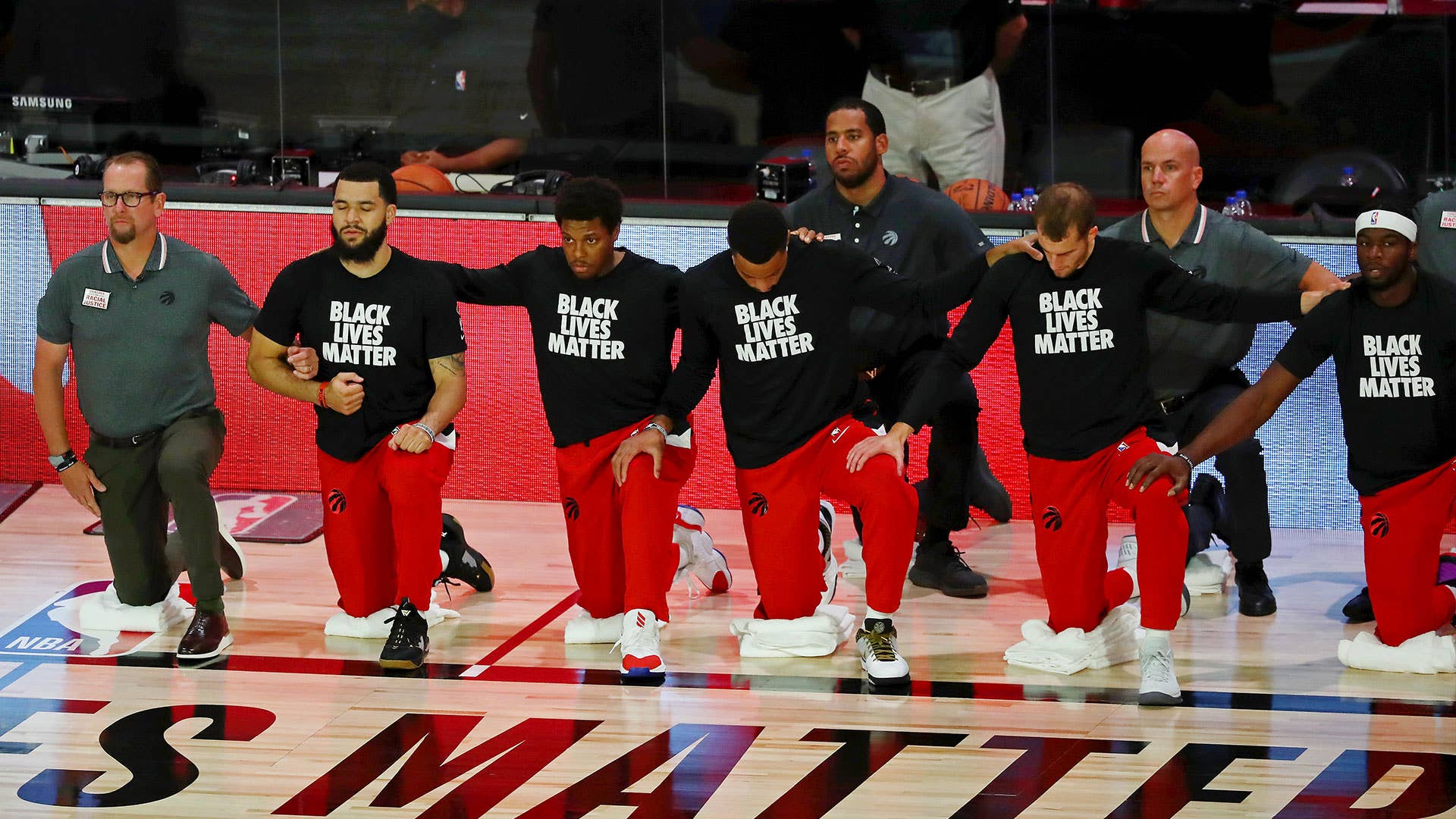
Fred VanVleet cut a disconsolate figure. Norman Powell could barely find the words to start but then aired out all his frustrations. Pascal Siakam refuses to watch the video of Jacob Blake getting shot seven times because he’s still traumatized by the murder of George Floyd.
After the Toronto Raptors and Boston Celtics were the first to publicly reveal that talks of not playing games was on the table, it was the Milwaukee Bucks players who didn’t show up onto the court for their Game 5 matchup with the Orlando Magic Wednesday. Basketball will return on the weekend, but in order for us to all do our part, we can never forget why it stopped.
“Coming down here and making the choice to play was supposed to not be in vain,” VanVleet said Tuesday. “But it’s just starting to feel like everything we’re doing is just going through the motions and nothing’s really changing, and here we are again with another unfortunate incident.”
Over the course of Wednesday and Thursday, it has been members of the NBA’s Black community taking a stand on the racial injustice they have suffered for far too long. Some of them have even felt guilt for playing when their brothers and sisters have been suffering, and their search for answers on how to make an impact sooner rather than later at least found some light Friday.
The NBA and NBPA released a joint statement and confirmed that, while the playoffs will indeed resume Saturday Aug. 29, the league and players have agreed to immediately establish a social justice coalition that includes representatives from players, coaches, and governors. The focus will range from increased access to voting to promoting civic engagement as well as advocating for meaningful police and criminal justice reform. Every city where league franchises own and control the arena property will also see efforts from governors to convert the arena into a voting centre in time for the 2020 general election. Finally, the league will also work with the players and broadcast networks to include advertising spots dedicated to promoting civic engagement, voter access, and opportunity in each playoff game.
"It's on all of us to get in front of these people's faces that make the laws and have the power to fully effect change, and force them to. Until that is done, ain't shit gonna change." - Norman Powell
At least on some level now, the players can feel as though they’ve been heard. For them to have been consistently preaching that Black Lives Matter, kneeling during the national anthems, and wearing social justice messages on the back of their jerseys, the complete disregard shown for Blake’s life and the three children who had to bear witness to the attempted murder of their father was a blatant slap in the face.
“Until we put some pressure and forces that stuff needs to be changed and start truly demanding for these laws and police reforms to take effect now, ain't nothing gonna change,” Powell said. “I'm gonna sit up here and continue to waste my breath and talk to you guys about what I'm doing and trying to help make change, but it's on all of us to actually stand up and demand things, and get in front of these people's faces that make the laws and have the power to fully effect change, and force them to. Until that is done, ain't shit gonna change.
“I'm gonna sit up here and answer your guys' questions and continue to say Black Lives Matter and make and effect change. But until we all who believe that and see what's going on are ready to step up and lay it on the line to make real change and move towards real progress and take the ones that don't belong in that field out, we're gonna keep seeing it over and over again.”
Ever since LeBron James left the Cleveland Cavaliers for the Miami Heat, the term “player power” has been used ad nauseam. It has specifically referred to the empowerment players feel in determining their futures as basketball players and their own individual happiness, but the decision to not step on the court Wednesday showed their power could find a whole new level if they can push back at franchise owners and challenge them to help fight for social justice. The NBA Board of Governors received a stern message that, while the players can certainly help them earn a heap of money, they will not be able to continue profiting off Black lives without fighting for them with real action. If the Board of Governors create better access to voting centres, put pressure on political and legislative contacts so Breonna Taylor’s family can see justice, so Jacob Blake’s family can see justice, and create more space for Black people within organizations, then player power takes on a whole different meaning.
This isn’t to say that players just sat and pointed the finger, either. According to The Undefeated’s Marc J. Spears, Oklahoma City guard Chris Paul was adamant that the fact only 20 percent of players are currently registered to vote was unacceptable and that every single player needed to be ready to cast a vote come the election. Boston’s Jaylen Brown challenged anyone who had ideas of leaving the Orlando bubble to make sure they left to protest and fight against police brutality instead of just relax at home with their families.
And that made me wonder again about the part we all have to play in all this.
“Are we gonna hold everybody accountable?” VanVleet asked Tuesday. “Or we’re just gonna put the spotlight on Black people, or Black athletes, or entertainers and say, ‘What are you doing, what are you contributing to your community, what are you putting on the line?’”
What are we doing in our little world to educate ourselves and those around us, to donate, have better work practices, to keep the conversation going? When the NBA returned, fans reacquainted themselves with the highs and lows of cheering on their basketball team and the media focused on the games as well. When the NBA stopped, we commented on what governors and players should do. But what about us, the people who consume the league in different ways and who the players have been consistently preaching to? As we waited to see what would come of the players’ and Board of Governors’ meetings, did we stop to ask ourselves what we could do?
In recognizing that this can’t just be the players’ burden and that more should lie in the hands of owners of these NBA franchises, the resumption of games should also signal that their time to play is also our time to do more work.

